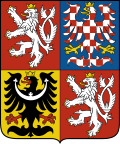| President of the Czech Republic | |
|---|---|
| Prezident České republiky | |
 | |
 | |
since 9 March 2023 | |
| Style |
|
| Type | Head of state |
| Residence | Prague Castle |
| Seat | Prague, Czech Republic |
| Appointer | Popular vote |
| Term length | Five years, renewable once consecutively |
| Constituting instrument | Constitution of the Czech Republic |
| Precursor | President of Czechoslovakia |
| Formation | 2 February 1993 |
| First holder | Václav Havel |
| Succession | Line of succession |
| Salary | 341,200 Kč per month[1] |
| Website | www.hrad.cz |
 |
|---|
|
|
The president of the Czech Republic, constitutionally defined as the President of the Republic (Czech: Prezident republiky), is the head of state of the Czech Republic and the commander-in-chief of the Armed Forces of the Czech Republic.[2]
The presidency has largely been shaped by its inaugural holder, Tomáš Garrigue Masaryk, who assumed the office after the Czechoslovak declaration of independence was proclaimed in 1918. The 1920 Constitution granted the president substantial powers and Masaryk's political strength and popularity enabled the presidency to exert considerable influence over the Czech public life.[3][4][5][6] In modern times, the president is largely a ceremonial figure with limited powers as the day-to-day business of the executive government is entrusted to the prime minister, and many of the president's actions require prime ministerial approval. Nevertheless, as the bearer of the nation's "Truth prevails" motto, the presidency is widely viewed to be a significant source of prestige, power and moral authority in both domestic and foreign affairs.[7][8][9] The president, seated at the Prague Castle, has oftentimes been perceived through the prism of the nation's monarchical past.[10][11] The office has retained the power to grant full pardons, commute criminal penalties and issue amnesties. The president possesses with a suspensory veto power which can be overridden by an absolute majority of the Chamber of Deputies.
The Constitution provides that the president cannot be held responsible for his own conduct, except in cases of treason or high violation against the Constitution.[12] The Parliament maintains the sole power of impeachment and the president may only be removed from office by a trial before the Constitutional Court.[13] The president is solely responsible for appointing the prime minister, the Cabinet ministers, as well as the members of the board of the Czech National Bank, and nominating justices to the Constitutional Court, who are subject to Senate approval, among others.
The president is elected directly using the two-round system to a five-year term. Prior to 2013, the president was selected by a joint session of the Parliament. Under Article 57 of the Constitution, no individual may be elected to more than two consecutive terms. The current president, Petr Pavel, was elected in the 2023 election, and assumed office on 9 March 2023.[14][15][16]
- ^ Morning, Prague (20 December 2022). "Salaries of Senior Czech Politicians To Rise 12.7% From January". Prague Morning. Retrieved 8 January 2024.
- ^ Mahoney, William (2011). The History of the Czech Republic and Slovakia. ABC-CLIO. p. 7. ISBN 978-0-313-36306-1.
- ^ Orzoff, Andrea (April 2008). "The Husbandman: Tomáš Masaryk's Leader Cult in Interwar Czechoslovakia". Austrian History Yearbook. 39: 121–137. doi:10.1017/S0667237808000072. S2CID 144231156.
- ^ McNamara, Kevin J. (March 2019). "Tomas G. Masaryk: A Life at the 'Bloody Crossroads'". Academic Questions. 32 (1): 123–131. doi:10.1007/s12129-018-9764-7. S2CID 149883546.
- ^ Burianová, Miroslava (2022). "Tomáš Garrigue Masaryk jako vizuální symbol první republiky" [Tomáš Garrigue Masaryk as a Visual Symbol of the First Republic]. Acta Musei Nationalis Pragae – Historia (in Czech). 76 (1–2): 5–16. doi:10.37520/amnph.2022.002.
- ^ Grinc, Jan (28 June 2019). "CONSTITUTIONAL STABILITY AND DYNAMICS IN THE CZECH REPUBLIC". International Comparative Jurisprudence. 5 (1): 16–26. doi:10.13165/j.icj.2019.05.003. ProQuest 2516366538.
- ^ Hloušek, Vít (December 2014). "Is the Czech Republic on its Way to Semi-Presidentialism?". Baltic Journal of Law & Politics. 7 (2): 95–118. doi:10.1515/bjlp-2015-0004.
- ^ Slosarcik, Ivo (February 2018). "Constitutional Development in the Czech Republic in 20132017: Direct Presidential Elections and Their Constitutional Consequences". European Public Law. 24 (1): 43–53. doi:10.54648/euro2018003. S2CID 148686502.
- ^ Czyżniewski, Marcin (31 December 2021). "Dispute over the Powers of the President of the Czech Republic". Polish Political Science Yearbook. 50 (4): 81–92. doi:10.15804/ppsy202143.
- ^ Kysela, Jan; Kühn, Zdeněk (February 2007). "Presidential Elements in Government The Czech Republic". European Constitutional Law Review. 3 (1): 91–113. doi:10.1017/S1574019607000910. S2CID 144697368.
- ^ Pithart, Petr (2014). "Úvaha o prezidentech na hrade ceských králu Dve dispozice: k pasivite v podhradí a k vudcovství na Hrade" [An Essay on Presidents at the Castle of the Czech Kings. Two Issues: Passivity beneath the Castle and Leadership at the Castle]. Politologická Revue (in Czech). 20 (2): 5–18. ProQuest 1646366672.
- ^ Kudrna, Jan (March 2015). "Responsibility for Acts of the President of the Czech Republic". Acta Juridica Hungarica. 56 (1): 39–58. doi:10.1556/026.2015.56.1.5.
- ^ Tomoszek, Maxim (June 2017). "Impeachment in the U. S. Constitution and Practice – Implications for the Czech Constitution". International and Comparative Law Review. 17 (1): 129–146. doi:10.2478/iclr-2018-0005.
- ^ "Retired Gen. Pavel wins election to become Czech president". Associated Press. 28 January 2023. Retrieved 28 January 2023.
- ^ Tait, Robert (28 January 2023). "Petr Pavel wins landslide victory in Czech presidential elections". The Guardian. Retrieved 28 January 2023.
- ^ Pirodsky, Jason (28 January 2023). "Petr Pavel elected President of the Czech Republic". Expats.cz.
